2018考研英语翻译:认识代词指代法_毙考题
2018英语中考各省市语法真题之代词及解析(可编辑修改word版)
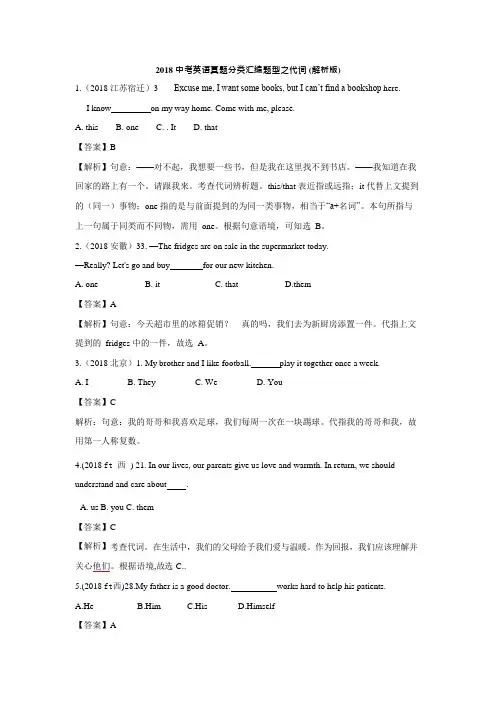
2018 中考英语真题分类汇编题型之代词(解析版)1.(2018 江苏宿迁)3 ----- E xcuse me, I want some books, but I can’t find a bookshop here.----I know on my way home. Come with me, please.A. thisB. oneC. . ItD. that【答案】B【解析】句意:——对不起,我想要一些书,但是我在这里找不到书店。
——我知道在我回家的路上有一个。
请跟我来。
考查代词辨析题。
this/that 表近指或远指;it 代替上文提到的(同一)事物;one 指的是与前面提到的为同一类事物,相当于“a+名词”。
本句所指与上一句属于同类而不同物,需用one。
根据句意语境,可知选B。
2.(2018 安徽)33. —The fridges are on sale in the supermarket today.—Really? Let's go and buy for our new kitchen.A. oneB. itC. thatD.them【答案】A【解析】句意:今天超市里的冰箱促销? -- 真的吗,我们去为新厨房添置一件。
代指上文提到的fridges 中的一件,故选A。
3.(2018 北京)1. My brother and I like football. play it together once a week.A. IB. TheyC. WeD. You【答案】C解析:句意:我的哥哥和我喜欢足球,我们每周一次在一块踢球。
代指我的哥哥和我,故用第一人称复数。
4.(2018 ft 西) 21. In our lives, our parents give us love and warmth. In return, we should understand and care about .A. usB. youC. them【答案】C【解析】考查代词。
2018考研英语翻译小技巧-毙考题

2018考研英语翻译小技巧-毙考题2018考研英语翻译小技巧 摘要:随着考研英语对长难句考察的侧重,近年来的翻译题中也出现了越来越多的长难句,让考生感到无从下手。
以下是一些翻译小技巧,帮助大家攻克英语翻译。
翻译过程中包括两个阶段:正确理解和充分表达。
理解是表达的前提,而表达是理解的目的和结果,二者缺一不可,因此,考生在做英译汉部分试题时:1、切记不可急躁,一定要先通读全句,把握主旨、内容;2、首先要在语义上理清全句的整体意思和每个单词的意思;其次要分析清楚句子结构,理出句群,找出各分句之间的关系;3、可考虑先打一份翻译草稿,再根据文章意义和汉语结构进行调整。
英语中一词多义的现象十分普遍,且英汉词典中给出的汉语解释未必全面,未必与英文的意思完全对等。
选择词义的时候,要根据词在句中的词类及上下文的搭配关系来确定。
英译汉中常考短语和句型:1、not that but that 不是而是2、can not too 再也不过分3、other than 除了,不同于4、It is reported / asserted / believed / considered / said /supposed that 据报道/据宣称/据说/据假设5、nothing less than 完全是,不亚于6、anything but 根本不,绝不7、nothing but 只有,不过......而已8、all but 除了9、but for 如果没有10、but that+从句要不是11、only to+动词结果是,不料12、not so much as 与其说不如说13、not so much as 甚至不14、not nearly/far from 不近/远15、by no means (同义短语还有:in no way,in no case, in no respects, at no time, on no account, under no circumstance) 决不16、to say nothing of/ still less(常用于否定句后) 更不必说17、let alone 更不用提18、no more than 同一样不19、no more than 只只,仅是考试使用毙考题,不用再报培训班邀请码:880620、more than21、more than 超出22、no less than 多达;足足有之多23、no less than 没有比更少;至少与一样考试使用毙考题,不用再报培训班邀请码:880624、apart from 分离25、no choice but 别无选择,只有考试使用毙考题,不用再报培训班邀请码:8806。
2018年考研英语真题
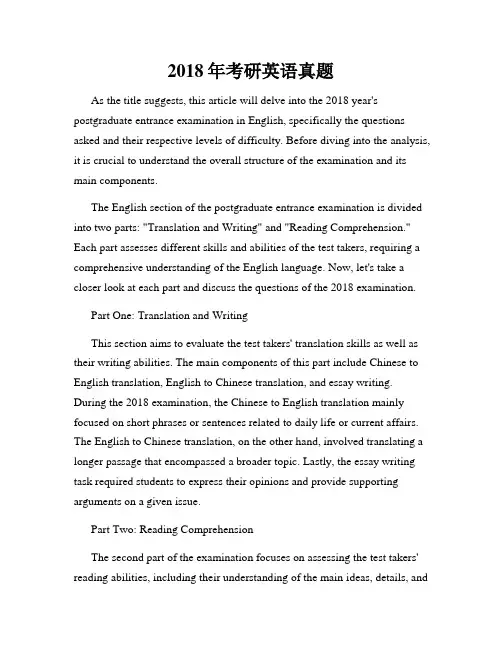
2018年考研英语真题As the title suggests, this article will delve into the 2018 year's postgraduate entrance examination in English, specifically the questions asked and their respective levels of difficulty. Before diving into the analysis, it is crucial to understand the overall structure of the examination and its main components.The English section of the postgraduate entrance examination is divided into two parts: "Translation and Writing" and "Reading Comprehension." Each part assesses different skills and abilities of the test takers, requiring a comprehensive understanding of the English language. Now, let's take a closer look at each part and discuss the questions of the 2018 examination.Part One: Translation and WritingThis section aims to evaluate the test takers' translation skills as well as their writing abilities. The main components of this part include Chinese to English translation, English to Chinese translation, and essay writing. During the 2018 examination, the Chinese to English translation mainly focused on short phrases or sentences related to daily life or current affairs. The English to Chinese translation, on the other hand, involved translating a longer passage that encompassed a broader topic. Lastly, the essay writing task required students to express their opinions and provide supporting arguments on a given issue.Part Two: Reading ComprehensionThe second part of the examination focuses on assessing the test takers' reading abilities, including their understanding of the main ideas, details, andlogical structure of the given passages. In 2018, the reading comprehension section consisted of three passages, each followed by several multiple-choice questions. The passages covered a wide range of topics, from social issues to scientific research, challenging the students' comprehension skills across various subjects.Analyzing the Difficulty of the 2018 ExaminationOverall, the 2018 English section of the postgraduate entrance examination was considered moderately challenging. The translation questions required a solid foundation of vocabulary and grammar, as well as a deep understanding of idiomatic expressions. The essay writing task tested the candidates' ability to articulate their thoughts in a clear and logical manner while presenting persuasive arguments. The reading comprehension questions demanded a keen eye for detail and the capability to grasp complex ideas within a limited time frame.In terms of difficulty, the translation questions were generally regarded as more challenging than the essay writing section. The short time given for translation tasks posed a particular challenge for test takers to accurately convey the original meaning while ensuring the natural flow of language. The essay writing, however, provided students with an opportunity to showcase their language proficiency and critical thinking skills, allowing for more creativity and personal insights.Regarding the reading comprehension section, the level of difficulty varied across the three passages. While some passages were relatively straightforward, others required a deeper understanding of specialized vocabulary and concepts. This disparity in difficulty ensured that a range ofabilities were tested, allowing for a fair assessment of the candidates' reading comprehension skills.ConclusionIn conclusion, the 2018 English section of the postgraduate entrance examination challenged test takers in various aspects of language proficiency. The translation and writing tasks demanded a strong grasp of vocabulary, grammar, and linguistic nuances. The reading comprehension section tested the students' ability to understand and analyze complex passages covering diverse topics.Preparing for the postgraduate entrance examination in English requires extensive practice in all areas of the language, from translation skills to essay writing and reading comprehension. By being exposed to a variety of topics and practicing under timed conditions, candidates can enhance their language abilities, improve their critical thinking skills, and increase their chances of success in the examination.。
2018考研英语常用动词-毙考题-4
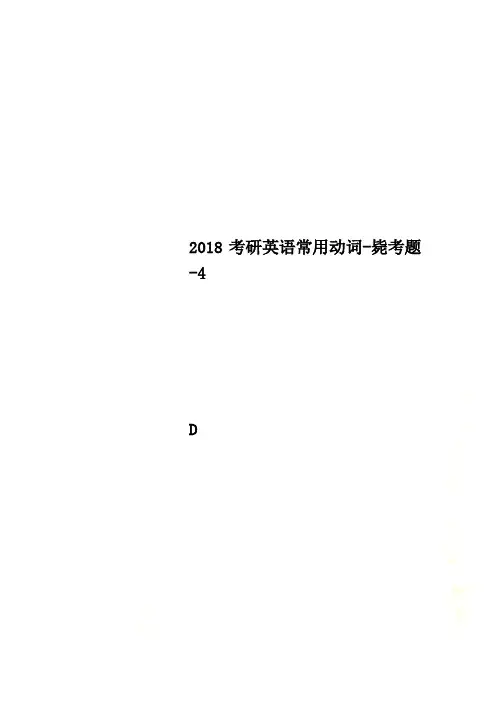
2018考研英语常用动词-毙考题-4Dmooring n 停泊(moor停船)clothing n 衣服(cloth布)flooring n 地板材料(floor地板)building n 建筑物(build建造)filling n 填料(fill填)legging n 绑腿(leg腿)footing n 立足点(foot足)(3)表名词,行业fishing n 渔业(fish鱼)banking n 银行业(bank银行)abvertising n 广告业(advertise做广告)accounting n 会计学(account计算)shoemaking n 制鞋业(shoe鞋+make制造+ing) dancing n 舞蹈(dance跳舞)(4)表形容词,正…的,令人…的envoreaging a 鼓舞人心的(encourage鼓励)changing a 正在变化的(change变化)outgoing a 友善的(out出+go走…走出去和别人交往…友善的)assuming a 自负的(assume自以为是,认为+ing)engrossing a 引人入胜的(engross吸引)fascinating a 迷人的(fascinate使…入迷)ingratiating a 讨好的(ingratiate讨好;grat感激)discriminating a 有辨别力的(discriminate分辨)exhilarating a 使人兴奋的(exhilarate兴奋,高兴;参考:hilarious十分高兴的)riceting a 十分精彩的(rivet柳钉,如柳钉一样牢牢吸引住)inviting a 诱人的(inviet邀请)81.-ion(1)表名词,动作或状态concision n 简洁,简明(concise简洁的,con+cise剪…把多余的剪掉)propulsion n 推进(propulse推进,pro+pulse 冲动)expansion n 扩张(expanse扩大,ex出+panse 扩展)apprehension n 担忧;逮捕(apprehend担心,逮捕,ap+prehend抓住)aversion n嫌恶,憎恨(averse逆反的,反对的,a反+verse转)obsession n 入迷(obsess入迷,ob在…中+sess 坐…坐在中间…入迷)profusion n 丰富;浪费(profuse…浪费的;充沛的,pro+fuse流)collusion n 勾结,串通(collude串通,搞阴谋,col+lud玩…共同玩)discussion n 讨任(discuss讨论,dis+cuss敲打…分开敲打…讨论)possission n 拥有,占有(possess拥有,pos能+sess坐…能坐在上面…拥有)approbation n 称赞,认可(approbate称赞,ap+prob证明+ate→证明正确)classification n 分类(classify分类,class类别+ify)allocation n 分配,拨给(allocate分配,al+loc 地方+ate…拨到地方上)convocation n 召集,会议(convoke召集,con+voke喊)dilapidation n 破旧,荒废( dilapidate使倒塌,di分开+lapid石头…扔石头…毁坏)obligation n 责任;债务(oblige对---负责任,ob[=to]+lig捆→捆起来)affiliation n 入会,加入(affiliate使紧密联系,a+fil儿子+iate)consolation n 安慰(console安慰,con+sole安慰)resignation n 辞职;听从(re后退+sign签字…辞去职位)lucubration n 刻苦研究(lucubrate刻苦攻读,luc灯光+ubr工作+ation)inflation n 通货膨胀(inflate充气,膨胀;in+flate气)(2)表示某种物,用品accordion n 手风琴(accord和谐+ion)cushion n 靠垫(cush垫+ion)carrion n 腐肉(carr肉+ion)scorpion n 蝎子(scorp原意是一种鱼,转化为蝎子)mansion n 大厦(manse住宅+ion)carnation n 康乃馨(carn肉+ation,康乃馨为肉色)confection n 甜食(con一同+fect做+ion…混合制成的糖果甜食)82.-ior表形容词,较…的anterior a 较早的(anter早)posterior a 较后的(poster后)exterior a 外部的(exter外)interior a 内部的(inter内)superior a 在上面的,超越的(super在上面) inferior a 低下的(infer下面)ulterior a 较晚的,较远的(ulter远)senior a 年长的(sen年老)junior a 年少的(jun年轻)83.-ious表形容词,…的curious a 好奇的(cur关心+ious)contagious a 传染的(con共同+tag接触+ious) specious a 似是而非的(spec看+ious…看上去是而实际不是)spacious a 宽敞的(spac空间+ious)penurious a 贫困的;小气的(penury贫困+ious) flirtatious a 调情的(flirt调情+ate+ious)euphonious a 悦耳的(eu美好+phon声音+ious)parsimonious a 小气的(parsi花费+mon警告,小心+ious…花钱小心…小气的)tedious a 冗长沉闷的(ted厌倦+ious)commodious a 宽敞的(commod舒适方便+ious)84.-ise(1)表动词后缀,和-ize相同,是-ize的变体,…化memorise v 记住(memor记忆)criticise v 批评(ctitic批评家)advertise v 做广告(advert注意到,ad+vert 转+ise)authorise v 授权(anthor权力;参考authority 权威)fertilise v 施肥,授精(fert肥沃…fertile 肥沃的)revitalise v 使复活(re再+vital活的)注:由-ize构成的一些动词publicize v 宣传(public公开的)exorcize v 驱除(坏事)(ex出+orc巫术,邪魔+ize)aggrandize v 扩张(ag+grand大+ize)jeopardize v 危害(jeopard危害+ize)materialize v 赋予…形体(material物质+ize) neutralize v 使中和(neutral中间的,中和的+ize)sterilize v 杀菌;使不育(steril无菌的+ize)homogenize v 使一致(homo相同+gen产生+ize)lionize v 崇拜(lion狮子+ize…把人当狮子看…崇拜)temporize v 拖延时间(tempor时间+ize)industrialize v 工业化(industrial工业的+ize) popularize v 推广,普及(popular流行的+ize) (2)表名词,物品,状态merchandise n 商品(merchant商人+ise)turquoise n 绿松石(turquo=turkish;因绿松石来自土耳其面得名)mortise n 榫眼(mort死+ise…木头敲进榫眼使…不再动摇)treatise n 论文(treat 治疗;研究+ise)exercise n 练习,锻炼(ex出+erc力量+ise) 85.-ish n(1)表形容词,像…一样,有的… ,通常放在一具体名词后snobbish a 势利眼的(snob势利眼)faddish a 时尚的,时髦的(fad时尚,流行的狂热)fiendish a 极凶恶的(fiend魔鬼)modish a 时髦的(mode时髦)waggish a 滑稽的(wag小丑)sluggish a 行动迟钝的(slug懒汉)churlish a 脾气暴躁的(churl粗鄙之人,小气鬼)boorish a 粗野的(boor粗野之人)coltish a 放荡不羁(colt小马驹)childish a 孩子气的(child孩子)bookish a 书生气的(book书本)foolish a 愚蠢的(fool笨蛋)coldish a 稍冷的(cold冷)yellowish a 微黄的(yellow黄色的)fattish a 稍胖的(fat胖)(2)表动词,造成…furbish v 刷新(furb擦亮+ish)embellish v 装饰(em进入+bell美丽+ish)polish v 擦亮(pol擦亮+ish)famish v 挨饿(fam饿+ish;参考;famine饥荒) banish v 放逐,摒弃(ban禁止,放弃+ish) admonish v 告诫(ad+mon警告+ish)impoverish v 使成赤贫(im进入+pover贫困+ish;参考:poverty贫困)vanquish v 征服(vanqu克服+ish)diminish v 缩小(di使+min小+ish)flourish v 繁荣(flour花+ish)vanish v 消失(van空,失去+ish)nourish v 养育,哺育(nour营养+ish)(3)表示国家的或语言english a 英国的n. 英语turkish a 土耳语的n. 土耳语swedish a 瑞典的n. 瑞典语lrish a 爱尔兰的n. 爱尔兰语。
2018考研英语翻译语法讲解:代词指代(1)_毙考题
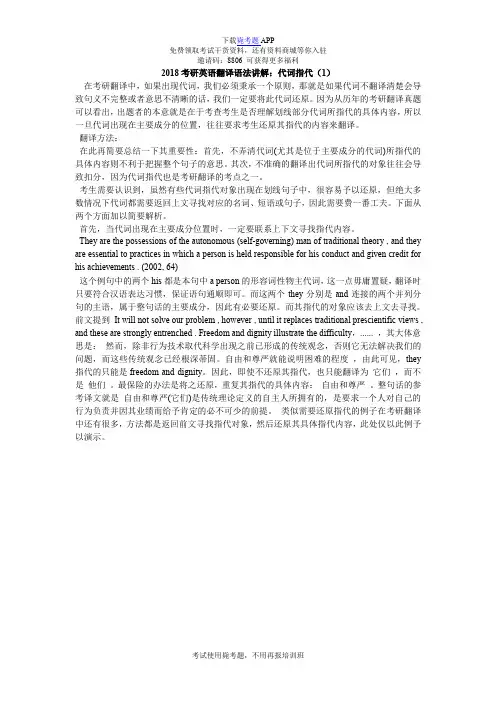
下载毙考题APP免费领取考试干货资料,还有资料商城等你入驻邀请码:8806 可获得更多福利2018考研英语翻译语法讲解:代词指代(1)在考研翻译中,如果出现代词,我们必须秉承一个原则,那就是如果代词不翻译清楚会导致句义不完整或者意思不清晰的话,我们一定要将此代词还原。
因为从历年的考研翻译真题可以看出,出题者的本意就是在于考查考生是否理解划线部分代词所指代的具体内容,所以一旦代词出现在主要成分的位置,往往要求考生还原其指代的内容来翻译。
翻译方法:在此再简要总结一下其重要性:首先,不弄清代词(尤其是位于主要成分的代词)所指代的具体内容则不利于把握整个句子的意思。
其次,不准确的翻译出代词所指代的对象往往会导致扣分,因为代词指代也是考研翻译的考点之一。
考生需要认识到,虽然有些代词指代对象出现在划线句子中,很容易予以还原,但绝大多数情况下代词都需要返回上文寻找对应的名词、短语或句子,因此需要费一番工夫。
下面从两个方面加以简要解析。
首先,当代词出现在主要成分位置时,一定要联系上下文寻找指代内容。
They are the possessions of the autonomous (self-governing) man of traditional theory , and they are essential to practices in which a person is held responsible for his conduct and given credit for his achievements . (2002, 64)这个例句中的两个his都是本句中a person的形容词性物主代词,这一点毋庸置疑,翻译时只要符合汉语表达习惯,保证语句通顺即可。
而这两个they分别是and连接的两个并列分句的主语,属于整句话的主要成分,因此有必要还原。
而其指代的对象应该去上文去寻找。
前文提到It will not solve our problem , however , until it replaces traditional prescientific views , and these are strongly entrenched . Freedom and dignity illustrate the difficulty,...... ,其大体意思是:然而,除非行为技术取代科学出现之前已形成的传统观念,否则它无法解决我们的问题,而这些传统观念已经根深蒂固。
2018考研英语:考研英语真题高频词组(一)_毙考题
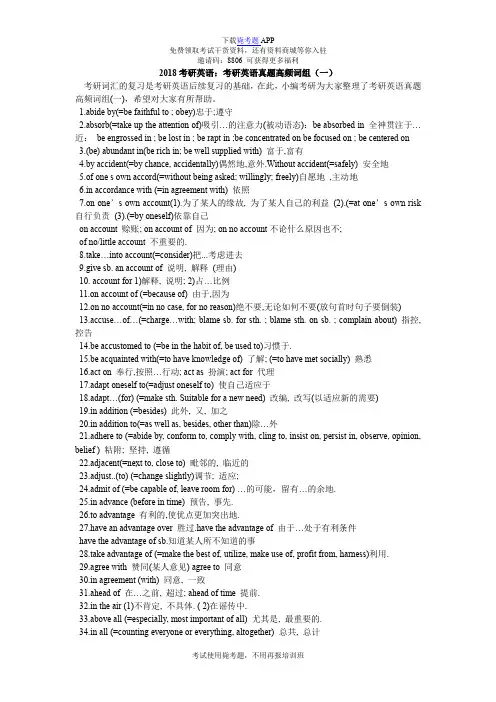
2018考研英语:考研英语真题高频词组(一)考研词汇的复习是考研英语后续复习的基础,在此,小编考研为大家整理了考研英语真题高频词组(一),希望对大家有所帮助。
1.abide by(=be faithful to ; obey)忠于;遵守2.absorb(=take up the attention of)吸引…的注意力(被动语态):be absorbed in 全神贯注于…近:be engrossed in ; be lost in ; be rapt in ;be concentrated on be focused on ; be centered on3.(be) abundant in(be rich in; be well supplied with) 富于,富有4.by accident(=by chance, accidentally)偶然地,意外.Without accident(=safely) 安全地5.of one s own accord(=without being asked; willingly; freely)自愿地,主动地6.in accordance with (=in agreement with) 依照7.on one’s own account(1).为了某人的缘故, 为了某人自己的利益(2).(=at one’s own risk 自行负责(3).(=by oneself)依靠自己on account 赊账; on account of 因为; on no account不论什么原因也不;of no/little account 不重要的.8.take…into account(=conside r)把...考虑进去9.give sb. an account of 说明, 解释(理由)10. account for 1)解释, 说明; 2)占…比例11.on account of (=because of) 由于,因为12.on no account(=in no case, for no reason)绝不要,无论如何不要(放句首时句子要倒装)13.accuse…of…(=charge…with; blame sb. for sth. ; blame sth. on sb. ; complain about) 指控,控告14.be accustomed to (=be in the habit of, be used to)习惯于.15.be acquainted with(=to have knowledge of) 了解; (=to have met socially) 熟悉16.act on 奉行,按照…行动; act as 扮演; act for 代理17.adapt oneself to(=adjust oneself to) 使自己适应于18.adapt…(for) (=make sth. Suitable for a new need) 改编, 改写(以适应新的需要)19.in addition (=besides) 此外, 又, 加之20.in addition to(=as well as, besides, other than)除…外21.adhere to (=abide by, conform to, comply with, cling to, insist on, persist in, observe, opinion, belief ) 粘附; 坚持, 遵循22.adjacent(=next to, close to) 毗邻的, 临近的23.adjust..(to) (=change slightly)调节; 适应;24.admit of (=be capable of, leave room for) …的可能,留有…的余地.25.in advance (before in time) 预告, 事先.26.to advantage 有利的,使优点更加突出地.27.have an advantage over 胜过.have the advantage of 由于…处于有利条件have the advantage of sb.知道某人所不知道的事28.take advantage of (=make the best of, utilize, make use of, profit from, harness)利用.29.agree with 赞同(某人意见) agree to 同意30.in agreement (with) 同意, 一致31.ahead of 在…之前, 超过; ahead of time 提前.32.in the air (1)不肯定, 不具体. ( 2)在谣传中.33.above all (=especially, most important of all) 尤其是, 最重要的.34.in all (=counting everyone or everything, altogether) 总共, 总计35.after all 毕竟,到底; (not) at all 一点也不; all at once(=suddenly)突然; once and for all 只此一次; above all 最重要的; first of all 首先; all in all 大体上说; be all in 累极了; all but 几乎.36.allow for (=take into consideration, take into account) 考虑到, 估计到.37.amount to (=to be equal to) 总计, 等于.38.answer for (undertake responsibility for, be liable for, take charge for) 对…负责.39.answer to (=conform to) 适合,符合.40.be anxious about 为…焦急不安; 或anxious for41.apologize to sb. for sth. 为…向…道歉42.appeal to sb. for sth. 为某事向某人呼吁. appeal to sb. 对某人有吸引力43.apply to sb. for sth. 为…向…申请; apply for申请; apply to 适用.44.apply to 与…有关;适用45.approve of (=consent to, be in favor of, favor, agree to, consider good, right)赞成, approve vt. 批准46.arise from(=be caused by) 由…引起.47.arrange for sb./sth. to do sth. 安排…做…48.arrive on 到达; arrive at 到达某地(小地方);得出,作出; arrive in 到达某地(大地方);49.be ashamed of (=feel shame, guilt or sorrow because of sth. done) 以…为羞耻50.assure sb. of sth. (=try to cause to believe or trust in sth.) 向…保证, 使…确信.51.attach(to) (=to fix, fasten; join) 缚, 系,结52.make an attempt at doing sth. (to do sth.) 试图做…53.attend to (=give one’s attention, care and thought)注意,照顾;attend on(upon)(=wait upon, serve, look after) 侍候,照料54.att itude to/ toward …对…的态度.看法55.attribute…to…(=to believe sth. to be the result of…)把..归因于.., 认为..是..的结果56.on the average (=on average, on an average) 平均57.(be) aware of (=be conscious of , having knowledge or consciousness)意识到,知道.58.at the back of (=behind) 在…后面59.in the back of 在…后部(里面); on the back of 在…后部(外面); be on one’s back(=be ill in bed) 卧病不起.60.at one’s back(=supporting or favoring sb.) 支持,维护; have sb. at one’s back 有…支持, 有…作后台61.turn one’s back on sb. (=turn away from sb. in an impolite way) 不理睬(某人),背弃,抛弃62.behind one’s back 背着某人(说坏话)63.be based on / upon 基于64.on the basis of 根据…, 在…基础上65.beat…at 在…运动项目上打赢66.begin with 以…开始. to begin with (=first of all) 首先, 第一(经常用于开始语)67.on behalf of (=as the representative of) 以…名义68.believe in(=have faith or trust in; consider sth./sb. to be true) 相信,依赖,信仰.69.benefit (from) 受益,得到好处.70.for the benefit of 为了…的利益(好处)71.for the better 好转72.get the better of (=defeat sb.) 打败, 胜过.73.by birth 在出生上,论出身,按血统at birth 在出生时; give birth to 出生74.blame sb. for sth. 因…责备某人blame sth. on sb. 把…推在某人身上75.in blossom开花(指树木) be in blossom开花(强调状态) come into blossom开花(强调动作)76.on board 到船上, 在船上, 上火车或飞机77.boast of (or about) 吹嘘78.out of breath 喘不过气来79.in brief(=in as few words as possible)简言之80.in bulk 成批地,不散装的81.take the floor 起立发言82.on business 出差办事.83.be busy with sth.忙于某事; be busy doing sth. 忙于做某事st but one 倒数第二.85.but for (=without) 要不是. 表示假设86.buy sth. for…money 用多少钱买87.be capable of 能够, 有能力be capable of being +过去分词:是能够被…的88.in any case(=for love or money, at any rate, at any price, at any cost, whatever happens; anyhow)无论如何89.in case (=for fear that) 万一;90.in case of (=in the event of)如果发生…万一; in the case of 至于…, 就…而言91.in no case在任何情况下都不(放句首倒装句)92.be cautious of 谨防93.center one’s attention on(=focus one’s attention on) 把某人的注意力集中在…上94.be certain of (=be sure of) 有把握, 一定.95.for certain of (=for sure )肯定地,有把握地96.by chance(=accidentally, by accident)偶然97.for a change换换环境(花样等)98.charge sb. with …控告某人犯有…99.in charge of (=responsible for) 负责(某事); in the charge of …由…管100.take charge of (=to be or become responsible for)负责管理(照顾)。
2018考研英语翻译语法讲解:定语从句(2)后置法_毙考题
下载毙考题APP免费领取考试干货资料,还有资料商城等你入驻邀请码:8806 可获得更多福利2018考研英语翻译语法讲解:定语从句(2)后置法第二种:后置法所谓后置法,是指把定语从句独立成句,翻译到所修饰的先行词之后。
非限制性定语从句与先行词关系不是很密切,往往采用后置法。
而在考研英语翻译中,有时划线句子所包含的定语从句虽是限制性的,但由于从句嵌套等原因,使得定语从句较复杂,这时如果直接将之翻译到所修饰的定语从句之前,就会显得臃肿不堪,读起来也会离汉语表达习惯相差万里,因此我们只能另辟蹊径,采取后置法。
具体操作方式是,通过重复先行词或者重复先行词的对应代词来引出定语从句的内容。
下面通过具体的例子进行详细说明。
1)One place where children soak up A-characteristics is school , which is , by its very nature , a highly competitive institution .2)They have been spurred in part by DNA evidence made available in 1998 , which almost certainly proved Thomas Jefferson had fathered at least one child with his slave Sally Hemings . 3)Immigrants are quickly fitting into this common culture , which may not be altogether elevating but is hardly poisonous .上面这三个句子中出现了三个定语从句,这些从句本身较复杂,且作为非限制性定语从句,与各自先行词的关系也不密切,我们可以考虑采用后置法。
2018年考研英语一试题与答案解析(完整版)
2018年考研英语一试题与答案解析(完整版)——跨考教育英语教研室Section I Use of EnglishDirections:Read the following text. Choose the best word (s) for each numbered blank and mark A, B, C or D on the ANSWER SHEET. (10 points)Trust is a tricky business. On the one hand, it's a necessary condition _____(1) many worthwhile things: child care, friendships, etc. On the other hand, putting your _____(2)in the wrong place often carries a high _____(3)._____(4), why do we trust at all? Well, because it feels good. _____(5) people place their trust in an individual or an institution, their brains release oxytocin, a hormone that _____(6) pleasurable feelings and triggers the herding instruct that leads sheep to flock together for safety and prompts humans to _____(7) with oneanother. Swiss Scientists have found that exposure _____(8) this hormone puts us in a trusting _____(9): In a study, researchers sprayed oxytocin into the noses of half the subjects; those subjects were ready to lend significantly higher amounts of money to strangers than were their _____(10) who inhaled something else._____(11) for us, we also have a sixth sense for dishonesty that may _____(12) us. A Canadian study found that children as young as 14 months can differentiate _____(13) a credible person and a dishonest one. Sixty toddlers were each _____(14) to an adult tester holding a plastic container. The tester would ask, “What's in here?” before looking into the container, smiling, and exclaiming, “Wow!” Each subject was then invited to look _____ (15). Half of them found a toy; the other half _____ (16)the container was empty-and realized the tester had _____(17) them.Among the children who had not been tricked, the majority were _____ (18) to cooperate with the tester in learning a new skill, demonstrating that they trusted his leadership. _____ (19), only five of the 30 children paired with the "_____(20)"tester participated in a follow-up activity.1. A.on B.like C.for D.from2. A.faith B.concern C.attention D.interest3. A.benefit B.debt C.hope D.price4. A.Therefore B.Then C.Instead D.Again5. A.Until B.Unless C.Although D.When6. A.selects B.produces C.applies D.maintains7. A.consult B.compete C.connect D.compare8. A.at B.by C.of D.to9. A.context B.mood C.period D.circle10. A.counterparts B.substitutes C.colleagues D.supporters11. A.Funny B.Lucky C.Odd D.Ironic12. A.monitor B.protect C.surprise D.delight13. A.between B.within C.toward D.over14. A.transferred B.added C.introduced D.entrusted15. A.out B.back C.around D.inside16. A.discovered B.proved C.insisted D.remembered17. A.betrayed B.wronged C.fooled D.mocked18. A.forced B.willing C.hesitant D.entitled19. A.In contrast B.As a result C.On the whole D.For instance20. A.inflexible B.incapable C.unreliable D.unsuitable1.【答案】C【解析】该题选择的是介词,与后面的many worthwhile things一块做后置定语修饰前面的condition,表明对于许多重要事情来说是一个必要的条件。
2018年考研英语真题及答案解析(2)
2018年考研英语真题及答案解析(2)Text 2For the first time in history more people live in towns than in the country. In Britain this has had a curious result. While polls show Britons rate”the countryside”alongside the royal family, Shakespeare and the National Health Serivce (NHS) as what makes them proudest of their country, this has limited political support.A century ago Octavia Hill Launched the National Trust not to rescue stylish houses but to save“the beauty of natural places for everyone forever”.It was specifically to provide city dwellers with spaces for leisure where they could experience“a refreshing air .”Hill’s pressure later led to creation of national parks and green belts. They don’t make countryside any more,and every year concrete consumes more of it . It needs constant guardianship.At the next election none of the big parties seem likely to endorse this sentiment. The conservatives’planning reform explicitly gives rural development priority over conservation,even authorising“off-plan”building where local people might object. The concept of sustainable development has been defined as profitable. Labour likewise wants to discontinue local planning where councils oppose development. The Liberal Democrats are silent. Only Ukip, sensing its chance,has sided with those pleading for a more considered approach to using green land. Its Campaign to Protect Rural England struck terror into many local conservative parties.The sensible place to build new houses,factories and offices is where people are,in cities and towns where infrastructure isin place. The London agents Stirling Ackroyd recently identified enough sites for half a million houses in the London area alone,with no intrusion on green belt. What is true of London is even truer of the provinces.The idea that”housing crisis”equals“concreted meadows” is pure lobby talk. The issue is not the need for more houses but, as always,where to put them. Under lobby pressure,George Osborne favours rural new-build against urban renovation and renewal. He favours out-of-town shopping sites against high streets . This is not a free market but a biased one. Rural towns and villages have grown and will always grow. They do so best where building sticks to their edges and respects their character. We do not ruin urban Development should be planned, not let rip. After the Netherlands, Britain is Europe’s most crowed country. Half a century of town and country planning has enabled it to retain an enviable rural coherence, while still permitting low-density urban living. There is no doubt of the alternative --- the corrupted landscapes of southern Portugal, Spain or Ireland. Avoiding this rather than promoting it should unite the left and right of the political spectrum.6.Britain’s public sentiment about the countryside[A]has brought much benefit to the NHS.[B]didn’t start till the Shakespearean age.[C]is fully backed by the royal family.[D]is not well reflected in politics.7. According to Paragraph 2,the achievements of the National Trust are now being[A]gradually destroyed.[B]effectively reinforced.[C]properly protected.[D]largely overshadowed.8.which of the following can be inferred from Paragraph 3?[A]Ukip may gain from its support for rural conservation.[B]the Conservatives may abandon ”off -plan“ building.[C]the Liberal Democrats are losing political influence.[D]labour is under attack for opposing development.9.the author holds that George Osborne’s preference[A]reveals a strong prejudice against urban areas.[B]shows his disregard for the character of rural areas.[C]stresses the necessity of easing the housing crisis.[D]highlights his firm stand against lobby pressure.10.In the last paragraph,the author shows his appreciation of[A]the size of population in Britain.[Bthe enviable urban lifestyle in Britain.[C]the town-and-country planning in Britain.[D]the political life in today is Britain.6.答案 D is not well reflected in politics解析:细节题。
2018考研英语阅读经验分享-毙考题
2018考研英语阅读经验分享-毙考题2018考研英语阅读经验分享摘要:俗话说得好,得阅读者得天下。
英语阅读(传统阅读+新题型)占考研英语总分的一半,想要在考研英语中拿到不错的分数,阅读部分一定不能拖后腿。
本文将介绍SLAM阅读法,帮助大家更好复习英语阅读。
作为一名刚刚结束2017考研征程的准研究生,心中除了有得偿所愿的欣慰;回顾自己一年的准备,更多的是对一路走来的一些关键点的铭记--那些栽过的跟头,以及迷茫困惑时被迫做出的抉择毕竟,那些磕磕绊绊的日子才最令人印象深刻。
简单介绍一下自己的考研情况吧,我本科就读于北京一所非985,非211的提前批学校,专业是英语。
目前跨考到首都经济贸易大学的会计专硕。
今年管理类联考156分,英语二83分,总分239分。
可能有人会觉得,英语一和英语二今年都比较简单,一个本科英语专业的人,英语二考了83分并不属于高分。
其实,我在考研结束后核对了答案,发现自己英语二完形填空扣了一分,传统阅读和阅读新题型全对,主要是主观题出现了问题。
下面我主要介绍一下我在复习英语阅读部门时的一些经为2部分:传统阅读理解4篇文章20个小题共计40分,阅读新题型5题共计10分。
从分数比重可见,得阅读者得天下。
而且,英语阅读水平提高了,即使语法不好,也可以通过语感弥补,那么完形填空的得分肯定不会太差。
我虽然是英语专业的,而且专业成绩也不错,四级600多,六级600差一点,专四专八都比较优秀,但很惭愧的是,我对于语法的掌握真的是令人发指,语法考试刚刚及格的就是我了。
所以,大家真的不要因为语法不好给自己太大的心理负担。
另外,英语阅读,单词量很关键,如果目不识丁,生词量太大,那做英语阅读无异于碰运气。
对于提高阅读理解题目的正确率,我这里给大家安利一个我一直用的方法:阅读理解SLAM 四部分析法。
1、Scan浏览快速扫描全文,了解全文大意。
主要通过读首尾段,中间段落的首句(或者加上尾句)进行信息摄入。
一篇考研的阅读理解,虽然摘录自国外的期刊杂志,但都被出卷人做了改写,一篇文章会有一个中心思想,所有的问题设置,尤其是意思理解类型题目的设置,也必然围绕这中心思想进行设置。
- 1、下载文档前请自行甄别文档内容的完整性,平台不提供额外的编辑、内容补充、找答案等附加服务。
- 2、"仅部分预览"的文档,不可在线预览部分如存在完整性等问题,可反馈申请退款(可完整预览的文档不适用该条件!)。
- 3、如文档侵犯您的权益,请联系客服反馈,我们会尽快为您处理(人工客服工作时间:9:00-18:30)。
下载毙考题APP
免费领取考试干货资料,还有资料商城等你入驻
邀请码:8806 可获得更多福利
2018考研英语翻译:认识代词指代法
英语翻译是考研英语中的重点难点,每年的英语翻译是得分率最低的题型,为了方便考生备考,下面为大家整理了考研英语翻译部分的一些翻译技巧,一起来学习吧!
2018考研英语翻译:认识代词指代法
英文忌重复,为了避免名词或名词性成分的重复,英文中多用代词,而汉语多重复,故汉语中较少使用代词。
这一差异的存在,就需要在英译汉的过程中加以适当的调整。
具体说来,英文中的代词类别繁多,有人称代词、不定代词、指示代词、关系代词等等;汉语中也有代词,但因为汉语多重复,且句子结构相对松散、句子相对较短小,不太注重形式,因而汉语里多用名词使得语义更加清楚,用的代词相对少很多。
这种语言和思维习惯上的差异会造成我们理解和翻译上的困难。
在考研翻译中,如果出现代词,我们必须秉承一个原则,那就是如果代词不翻译清楚会导致句义不完整或者意思不清晰的话,我们一定要将此代词还原。
因为从历年的考研翻译真题可以看出,出题者的本意就是在于考查考生是否理解划线部分代词所指代的具体内容,所以一旦代词出现在主要成分的位置,往往要求考生还原其指代的内容来翻译。
考试使用毙考题,不用再报培训班。
